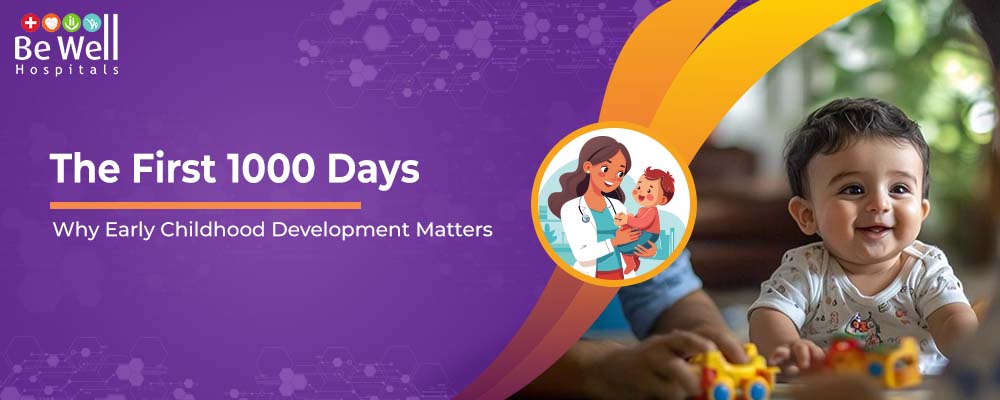The First 1000 Days: Why Early Childhood Development Matters

Introduction
The First 1,000 days of life—spanning from conception to a child’s second birthday—are a transformative period that lays the foundation for lifelong health, cognitive development, and overall well-being. During this crucial window, a child’s brain forms at an astonishing rate, neural connections are established, and the immune system is shaped, making it one of the most critical phases for physical and mental growth. Scientific research has consistently shown that proper nutrition, responsive caregiving, and a stimulating environment during these early years can significantly influence a child’s future potential, reducing the risk of chronic diseases, enhancing cognitive abilities, and fostering emotional resilience. Understanding the timeline of these 1,000 days, along with the key developmental milestones, provides invaluable insight into how early experiences shape a child’s trajectory in life. In this blog, we delve into the science behind early childhood growth, explore the profound impact of the first 1,000 days on brain development and immunity, and discuss why ensuring the right care and nourishment during this period is essential for building a healthier and brighter future.
Nutrition: The Foundation for Healthy Growth
Nutrition serves as the cornerstone of a child’s healthy growth and development, especially during the first 1,000 days, as it influences brain function, immunity, and overall well-being. The Key Aspects of Nutrition during this Critical Period are
Ensuring optimal nutrition from pregnancy through a child’s early years is not just about immediate growth—it’s about setting the stage for a lifetime of good health, strong immunity, and cognitive success.
Cognitive and Emotional Development
The first 1,000 days are crucial for cognitive and emotional development, as early experiences shape brain architecture and future well-being.
A nurturing, engaging environment during this period supports intellectual growth and emotional well-being, helping children become confident and resilient individuals.
Health and Immunity in the First 1000 Days
A child’s health and immunity are largely shaped during the first 1,000 days, making this period crucial for lifelong well-being. Vaccinations protect against life-threatening diseases like measles, polio, and pneumonia, while regular check-ups help detect developmental delays and nutritional deficiencies early. Infants have underdeveloped immune systems, making them more vulnerable to infections, but exclusive breastfeeding, proper handwashing, and maintaining hygiene significantly reduce health risks. A clean and safe environment minimizes exposure to pollutants and infections, supporting healthy growth. Parents and caregivers play a key role in ensuring proper nutrition, timely medical care, and a nurturing environment. Prioritizing a child's health during these early days strengthens immunity, reduces disease risks, and lays the foundation for a healthier future.
Long-Term Benefits of Investing in Early Development
The first 1,000 days of life play a crucial role in shaping a child's future, influencing their health, learning abilities, and overall well-being.
Investing in early childhood development ensures lifelong benefits, empowering individuals to lead healthier, more successful, and fulfilling lives.
Challenges and Barriers in Early Childhood Development
Early childhood development shapes a child's future, but challenges like poverty, malnutrition, and lack of healthcare hinder growth, especially in underprivileged communities. Limited prenatal care, poor maternal nutrition, and inadequate sanitation contribute to health and developmental delays. Social and economic disparities further widen the gap, leading to higher stunting rates, lower immunization coverage, and reduced early learning opportunities. These inequalities impact long-term well-being, affecting education and job prospects. Addressing these issues requires stronger healthcare systems, nutrition programs, and expanded early education. Empowering families with knowledge of caregiving, hygiene, and early stimulation can help mitigate poverty’s effects. By prioritizing early development, societies can break the cycle of disadvantage, ensuring every child has the opportunity to thrive.
Practical Tips for Parents and Caregivers
Parents and caregivers shape a child’s health, intelligence, and emotions in the first 1,000 days through nutrition, learning, and love, building a strong foundation for lifelong success.
By ensuring good nutrition, early learning, and emotional care, parents can help children grow into happy, healthy, and capable individuals.
Conclusion
The first 1,000 days shape a child’s health, learning, and future well-being. Proper nutrition, early stimulation, and a safe, loving environment are crucial for brain development and immunity. Parents, healthcare providers, and society must work together to ensure every child gets the best start. Investing in early childhood care leads to healthier individuals and stronger communities. At Be Well Hospitals, our Neonatology and Paediatrics Department provides expert medical care, new-born support, and paediatric services to help parents navigate this critical period.
Prioritize your child’s health from the start—visit your nearest Be Well Hospitals or call 9698 300 300 to book an appointment today. Together, we can build a healthier future for the next generation.
